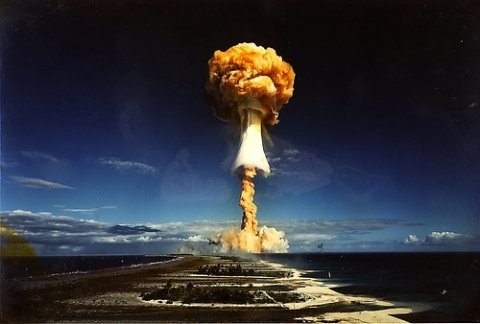The United States secretly helped France develop advanced nuclear weapons in the 1970s as part of a bid by the Nixon administration to sow divisions in Europe, declassified US documents showed.
Henry Kissinger, the senior aide to President Richard Nixon and apostle of realpolitik, is quoted as saying that he wanted to make the French “drool” and think they could compete with Britain, weakening efforts for European unity.
France first tested an atom bomb in 1960 in the Sahara, becoming the fourth nation after the United States, Soviet Union and Britain to go nuclear as President Charles de Gaulle tried to project France as a great world power.
The United States under three presidents refused atomic cooperation with France as it worried about de Gaulle’s foreign policy and feared he was setting off an arms race that would lead the divided Germanys to seek nuclear weapons.
The declassified documents confirmed suspicions that Nixon quietly shifted course after entering the White House in 1969, concluding the United States could not stop France’s program and should instead use it as leverage.
The documents were obtained by the National Security Archive at George Washington University and the Nuclear Proliferation International History Project at the Woodrow Wilson International Center for Scholars.
Skirting US law that prevented direct nuclear assistance to France, the Nixon administration offered “negative guidance” by telling the French if their projects were headed in the right direction, the documents showed.
The French apparently were agreeable, with Robert Galley — the defense minister under President Georges Pompidou — asking the United States for guidance on building a nuclear warhead, the documents showed.
Kissinger, then Nixon’s nuclear security adviser, said the United States would give information slowly and vowed: “I will brutalize Galley.”
“What we want is something which makes Galley drool but doesn’t give him anything but something to study for a while,” Kissinger said in a 1973 memorandum.
He complained that Britain — which was suspicious about Kissinger’s views on what eventually became the European Union — had not helped defend a key nuclear treaty between Nixon and the Soviet Union.
“The British are behaving shitty. If they know we have another option, they might buck up,” Kissinger said.
In a separate message to Nixon, Kissinger said the United States had “no obligation to bend over backward” for France. He doubted France would return to the NATO fold and complained of French policy toward Laos amid the Vietnam War.
But Kissinger concluded in another document: “We want to keep Europe from developing their unity as a bloc against us. If we keep the French hoping they can get ahead of the British, this would accomplish our objective.”
The Nixon administration was an anomaly for the United States, which has largely supported European integration as a way to ensure peace on a continent ravaged twice by war in the 20th century.
Klaus Larres, a professor at the University of Ulster who is researching the era, said that the Nixon administration was primarily concerned that the European Community would become a trade rival at a time of US economic woes.
“Previous administrations had always gone out of their way to bring the Europeans on board and push them in the integration direction. That stopped with Nixon and Kissinger, mostly for economic reasons,” he said.
William Burr, a senior analyst at the National Security Archive, said it was unclear how much France benefited from the US assistance as French documents on its nuclear program remained strictly classified.
“But the French kept asking for more, so it would suggest that they must have seen a benefit from this process,” Burr said.
The United States and France officially agreed to start nuclear cooperation in 1996 under presidents Bill Clinton and Jacques Chirac. Two years later, India and Pakistan tested nuclear weapons and were punished by sanctions.










